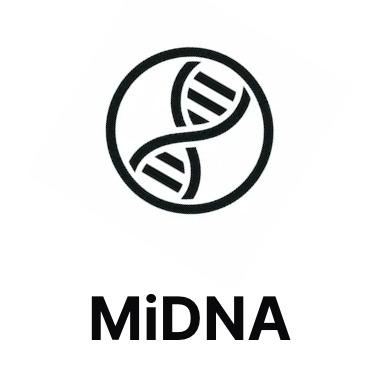MiDNA
MiDNA (Mina for DNA Analysis) is a service that utilizes Mina and ZKApp. DNA sequence data are analyzed by the service in an offline. Only the user who made the payment with Mina can see the results.
Created on 31st March 2024
•
MiDNA
MiDNA (Mina for DNA Analysis) is a service that utilizes Mina and ZKApp. DNA sequence data are analyzed by the service in an offline. Only the user who made the payment with Mina can see the results.
The problem MiDNA solves
MiDNA is a service that analyzes the presence or absence of rare or genetic diseases. It is a service that has benefits for both screeners who provide genomic information and companies that analyze genomic information:
- For screeners, the ZKApp (MiDNA Client), which operates offline, allows them to use their genomic information for analysis without leaking it to the outside world. In order to check the analyzed results, they will be authenticated to access the analysis result data by providing a certain amount of gas required for the analysis using Mina. At this time, no information other than the testee's personal information or genomic information is transmitted. This allows the testee to use the analysis service without exposing their important genomic and health information to the outside world.
- For analysis service providers, they can target customers who want to use analysis services but are reluctant to expose their information. Since payment through Mina is required to get the analysis results, you can monetize with a stable payment pipeline. Additionally, you can contribute to the expansion of the Mina ecosystem through applications that are utilized in the Mina ecosystem.
To take advantage of the above advantages, we utilized the o1.js library based on ZKP-snark and used Protokit to create off-chain / on-chain services that operate on top of Mina while using this library easily.
Challenges we ran into
Here are some of the challenges we faced during the project
- Based on our experience with Solidity, the use of Protokit provided a different user experience. This made it difficult to fully digest within the short timeframe of the hackathon. In particular, we think it would be easier and more comfortable to develop if there were more use cases.
- The scope of applying ZKP was limited to anonymity, which made it difficult to apply it more widely. We approached the problem by trying to make it as simple and universal as possible, while still providing maximum anonymity.
- Since it is a proof-of-concept for genome sequencing, many modifications are needed for actual service realization. In particular, genomic data is very large, so there are challenges to solve. In the hackathon, we used a strategy of extracting only simple sequences and converting the similarity of specific sequences into a score and visualizing it.
Tracks Applied (1)
Mina Protocol
Mina Protocol
Cheer Project
Cheering for a project means supporting a project you like with as little as 0.0025 ETH. Right now, you can Cheer using ETH on Arbitrum, Optimism and Base.
Discussion
Builders also viewed
See more projects on Devfolio
